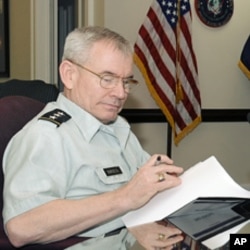Lieutenant General Ronald Burgess said there have been notable successes against the Taliban and al-Qaida by U.S. troops in Afghanistan and Pakistani troops on the other side of the border in South Waziristan and Swat.
"I think that we have been very successful in our operations in Afghanistan, and I think that our Pakistani partners have been fairly successful in some of their undertakings," he said. "But what we see happening with al-Qaida is that they still have the ability, working with the Taliban and some of the other groups in there, to cause pain and to bring about some of the more spectacular events that may occur from time to time," he added.
In an exclusive VOA interview, General Burgess says it is not clear how much the Pakistani military operations have reduced the threat to American and NATO troops in Afghanistan.
"What is unclear to me as I look at it as an intelligence professional is how many of the enemy have actually been taken off the board, so to speak. Or has the enemy melted away into the countryside or moved to another location?" Burgess asked. "While there is always something to be gained by forcing an enemy out of its sanctuary, at the end of the day I think this is an enemy that you are going to have to kill," he said.
Pakistan's military - reluctantly, according to many American analysts - began a ground offensive in October to clear out the terrorist sanctuaries in the South Waziristan area of Pakistan's tribal lands.
On the other side of the border, General Burgess said there is not as much of a traditional lull in fighting in Afghanistan's winter months as in previous years.
"The enemy always has a vote. In the past we have seen a drawdown, if you will, in terms of their activities over what we would call the winter months. We Are not sure we are going to see that as much this winter," he said. "We expect to see the numbers this winter, in terms of engagements and casualties if you will, to be up over last winter. But I think you will not see the numbers that you saw, for example, during the summertime just because of the nature of the seasons over there," he said.
A nagging question remains of whether Pakistan is helping the Taliban as part of a grand strategy to thwart growing influence in Afghanistan by Pakistan's arch-rival India. The allegation is common among many Western analysts, but Pakistan denies it.
General Burgess says he takes Pakistan's top leaders at their word. But, he adds, lower-ranking officers of Pakistan's Inter-Services Intelligence Directorate, the ISI, may be helping the militants without official sanction.
"They say that there is no official relationship that exists with those [groups]," he said. "But that is not to say that inside an intelligence organization that at some lower level, as far down as you might want to go, that someone does still not have an old relationship that may have spanned the last 15 or 20 years. That is somewhat in the nature of the intelligence business. But I am comfortable that there is no official connection that I see at this time," said Burgess.
A just-released report by the chief of U.S. military intelligence in Afghanistan calls military intelligence efforts there token and ineffectual. In the report - released without Pentagon approval - Major General Michael Flynn said analysts focus almost exclusively on insurgent groups, but know little about the social and political environment in which they operate.
General Burgess says he would have preferred the issue to have been kept within the intelligence family, calling the report's release outside of official channels "unusual". He says he does not agree with all of General Flynn's recommendations, but says they deserve serious study since he is the top military intelligence officer in Afghanistan.
"As the J-2 [intelligence chief] he has identified some of those shortcomings. And so now we as entity need to address some of those. But at the end of the day he, as the J-2 on the ground, has to allocate the resources to get the information the commander needs," he said.
General Burgess says DIA is also studying what lessons it can learn from the December 30 suicide bombing at a CIA base in Afghanistan that killed 7 CIA officers and a Jordanian intelligence official.
"We all have folks on the ground out there doing that type of mission. And what we have taken that to do for us here inside the Defense Intelligence Agency is, "Okay, what facts can we glean from that?" He asked. "And because we are a learning organization, what can we take from that and apply to our tactics, techniques, and procedures to ensure that we try to mitigate the possibility of something like that happening? But, you know, this is war," he concluded.
About 30,000 additional U.S. troops are being deployed to Afghanistan in the coming months as part of a new strategy. An undisclosed number of them will be military intelligence personnel.












